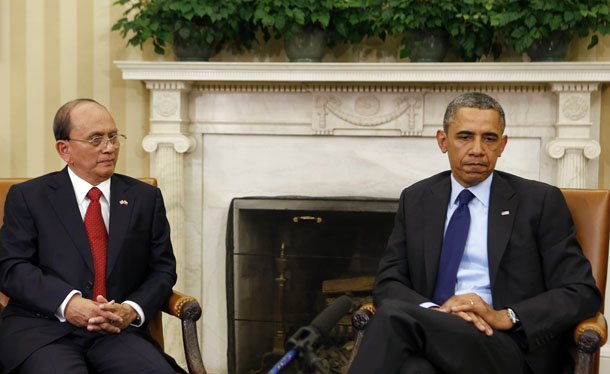A top official in Burma’s President’s Office has urged the United States Congress not to block military cooperation between the two countries, warning that a bill under consideration would only increase the isolation of the Burmese army at a crucial time.
American lawmakers have proposed legislation to restrict funding for US security assistance to Burma—including education and training and peacekeeping operations involving Burmese soldiers—until the country improves its human rights situation, cuts military ties to North Korea, amends the Constitution and makes progress on ending the ongoing wars with ethnic armed groups.
The Burma Human Rights and Democracy Act of 2014 was first introduced in Washington, D.C., in April. It has been approved by the congressional Foreign Affairs Subcommittee on Asia and the Pacific but has not been voted on by Congress. It comes after the administration of President Barack Obama encouraged Burma’s reformist quasi-civilian government with the promise of military re-engagement.
Zaw Htay, a director in the Burmese President’s Office, told The Irrawaddy on Thursday that US lawmakers should vote against the bill.
“If the Congress decided to agree, it would be a wrong move as it would further isolate our military, which has been playing an important role in reforms and the democratic transition,” he said.
Zaw Htay also suggested that the United States should in fact be increasing its cooperation with Burma as the country faces a new threat from Al-Qaeda.
The militant Islamist group has announced plans to expand its operations in South Asia, with Pakistan-born leader Ayman al-Zawahri announcing that the formation of “al-Qaeda in the India Subcontinent” would be good news for oppressed Muslims “in Burma, Bangladesh, Assam, Gujarat, Ahmedabad and Kashmir.”
“They [US lawmakers] should be aware of our situation. Burma is facing the terror threat, along with India,” Zaw Htay said.
“We should be collaborating for [global] security, for the anti-terror activities during our transition period.”
The President’s Office director said that “proactive engagement” by the United States would encourage the Burmese military, known as the Tatmadaw, to reform. He highlighted the Tatmadaw’s collaboration with United Nations agencies on the issues of child soldiers, and top commanders’ condemnation of forced labor in conflict areas as signs the army is willing to embrace reform.
Since the US revived ties with Burma, the Burmese military has been allowed to observe the Cobra Gold regional military exercise, and the possibility of Burmese troops serving in UN peacekeeping forces has been touted.
Zaw Htay said that during a visit to Burma last month, US Secretary of State John Kerry invited Burmese parliamentarians to take part in an exchange program with Congress.
“We will use this channel to sort out challenges and to exchange information they have about us and our challenges. Our parliaments need to work together to have enough information on the issues,” he said.
“The decision is totally upon them [the US lawmakers], but I just want to raise whether now is good timing.”

















